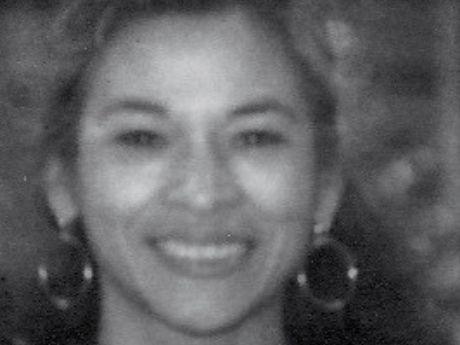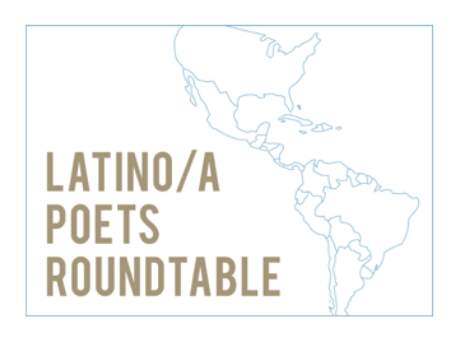Latino/a Poets Roundtable
On This Day

On This Day
Events evolved from a hairline fraction, compounded. Then the screw-brained physicists and some nested writers posited that there is no beginning and there is no end because they couldn't imagine it [footnoted], and … they wrote it.
Esterhaus and Olmedo have no real or imagined experience that contradicts that assertion, so they therefore create this day in infinity. Start from what you assume to be obvious. You are free to circle from any point therein. It could be of only a moment or less. It can be anywhere it wants to be—and is. It exists because you are about to read are reading have readied the words. Thus they—all of them—speak as two-fer-one. The words are complementary, the formalities of creation. Olmedo and Esterhaus alternate positions as to following, that is, in whatever order it comes. They can be switched out.
ȼ l ȼ
[Olmedo] All right. Let there be lite: but use a filtered gel. Slide it onto the instrument then hang it from a tetherball pole—something. Fade it up to about 80%—no, dim that down to 60—soft-focus, warm, er … more intimate. Where the lite hits the water, paint it read to reflect blood. Try to match it as closely as possible. Then rest for a while and replenish your juices. Spit out what you can't use.
[Esterhaus] Ready? Next: find three right words. Correct them. Put them into a natural fiber basket and spray them throughout the well, un/known universe, as if seeding its guts. Allow them, however long it takes, to gestate. Then collect them. Grind them down to a fine mill and mix them into something else. Serve them up at a formal dinner, as if seating their guts. Be sure to offer a prayer of thanksgiving before feeding your gut. Rest for a while and let the torpor take over. Recollect the feeling for as far as you can throw it away. Reseed as necessary.
[Olmedo] Wake up. Try this: recolor your eyes so that they see differently. Remember, blue isn't always blue, and so forth. Commission a work of self-awareness but make certain it has at least one recognizable attribute. Render it trilingual for variety and sleep it in during breaks in communication or borders in time or blends in race. When it has ground to essential, gather the remains, put them in a dust bowl and release them into a tornado about to happen. Wait to see what happens, especially if the molecules regenerate or touch down. Recede as necessary.
[Esterhaus] You need details. Open these: gold magnolias and humid, overrated charm pops. In a large yard of lurid imagination, chase chickens for their feathers, then break their necks. Feed the masses and pray you never have to feel … your hands freeze from plucking entrails. The stench is a real killing. Machines would do better but they're not as flexible as the human condition on its worst day.
[Olmedo] Move as action counts, only. Noticing motion capture: an ant survives by swimming. It's a prodigious swimmer and has been around for both documentary film and imputed ages. It feels and smells everything it touches even as it can't see very well but is directed. Its discipline isn't work—it's all it knows about life, despite the many eyes of its poor vision and the substitutions of perception. See if you can see it from its points of view, then transfer that as feeling to others in general. If they can't see it's because you didn't touch them or … seed … a path in the pristine water. Swim further on, using all six crawl points. Ants also have six, and an abdomen, like you.
[Esterhaus] Means have weight and carry it. If there could be no sin: it would be classless. Need is as voracious as it comes when it comes to and blindness can do nothing to prevent murder. Green, although sometimes catholically mistaken for hope, is collected in the second round for gold … vestments that only partially cover two or three of the seven death squad sins. Three dollars every seventh day is a cycle. Hunger … is mortgaged by gamblers who mean to mean well but are desperately ill. The means-less are not mean and their meaning is relative to who or what has come to count … as imported good or immigration. At the end of the day, ants don't crawl; they march single file, lured by the distinct object of their next meal. On average, they work forty-five days and die by sixty. Computers can't count as far as they've been.
[Olmedo] Find your breaking point. When to give up: what is most important to you. You've been asleep. You had dreams. A few nightmares crept in and woke you. You were your own worst main attraction and you had bad company. You tear up the lawn and soil [yourself] beneath it to kill the goddamned weeds then lay in long, narrow sod lengths of fresh, tender green grass. It [just simply] can't be bothered but must be watered carefully for at least four weeks or it will die. You build a fence and stand by with a sturdy garden hose. At midnight you turn on the water and hope no one drives by you on the way home.
[Esterhaus] Pretend none of it's here. Link to others as: if a butterfly in the desert missed a beat and no one saw or heard a thing. Size up the options. Separate out the plump ones that are yours and put them away in a safe place as soon as you find it. Auction off what's leftover from the overpass on any freeway. Pick one you know and look where to cross [ir]regularly. As the bidders drive and drive themselves under, throw them a tidbit to let them know you're sincere. Then turn off your bullhorn. Have a happy birthday.
Poem was originally published in Segue. All rights reserved. Reprinted with the permission of the author.
elena minor's work is provoked by a basic curiosity about the mystery, paradox and possibilities of spaces, symbols and juxtapositions in language. Her work has appeared in more than two dozen print and online journals, including RHINO, Mandorla, Hot Metal Bridge, OCHO, 26, Puerto del Sol, Diner, Poetry Midwest, Quercus Review and Segue. She is a recipient of the Chicano/Latino Literary Prize and is founding editor of PALABRA A Magazine of Chicano & Latino Literary Art.
More Latino/a Poets Roundtable
Introduction to Latino/a Poets Roundtable
At its core, Latino literature is about the tension between double attachments to place, to language, and to identity.
Read ArticleLatino/a Poets Roundtable, part one
A roundtable conversation with poets Maria Melendez, Raina Leon, Hope Maxwell Snyder, Albino Carrillo, Felicia Gonzalez, Mark Smith-Soto, Blas Falconer, Juan Morales, Roberto Tejada, Emma Trelles, and elena minor.

